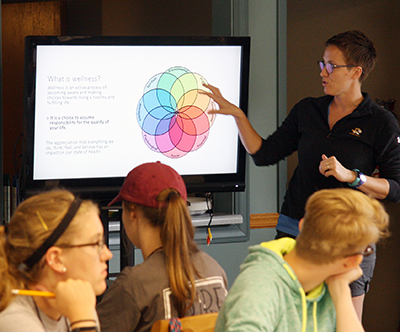
Making a Difference
As she answered the call and found out who was on the line, Dr. Tamara Hancock was a little bewildered.
“Why is the dean of the vet school at Iowa State calling me,” the 2011 DVM graduate wondered.
Then all kinds of things started swirling around in her mind. It was her birthday and she thought it was nice for her alma mater to call and wish her happy birthday. She still wasn’t really tracking when Dr. Dan Grooms, the Dr. Stephen G. Juelsgaard Dean of Veterinary Medicine told Hancock she was the inaugural recipient of the College of Veterinary Medicine’s Outstanding Young Alumni Award.
“This has to be a mistake,” Hancock thought. “What have I done to deserve this award.”
What Hancock has done is position herself to have a major impact on the future of veterinary medicine. As the coordinator for curriculum and student outcomes with the College of Veterinary Medicine at the University of Missouri, she has focused her efforts on improving awareness of mental health needs for veterinary medicine students.
Here she has channeled her concern and passion for the well-being of veterinarians into a role she is uniquely qualified for.
Hancock’s road to veterinarian and veterinary change agent is a long and winding one. The Iowa native isn’t one of those individuals who always knew she was going to be a veterinarian when she grew up.
She went a different route, earning an associate’s degree in design technology and working as a design drafter. Despite having what she describes as a “really good job,” something was missing in Hancock’s life.
“I wanted to give back to the community. I’d always like working with animals so I volunteered at my local shelter,” she said.
That experience led to a career change as a triage nurse and veterinary assistant in Kentucky before she entered veterinary school at Iowa State. It was during orientation, just days before Hancock started classes, that her class was asked to write letters to their future self.
“I wrote that I wanted to be an emergency veterinarian and help animals and their owners,” she said. “Never in a million years did I think I would be doing what I’m doing today.”
Instead Hancock became board certified in veterinary pathology, serving as a clinical pathology resident at the University of Missouri. There she earned both a master’s and PhD before moving into the academic side of veterinary medicine, serving a dual role as both the coordinator of curriculum and student outcomes and as a teaching assistant professor.
She will admit she interjects herself into other areas of the college she is passionate about such as addressing the shortcomings in inclusion and diversity. In this role Hancock teaches students and colleagues alike about implicit bias and inclusive language.
“This is a huge part of what I do,” she said. “I purposely asked to be a part of the college’s diversity seminar committee and then initiated a seminar series.
“I want to help shape the future my generation and future generations will inherit. I want to help create a future where I hope I can find myself in while finding the things that bring me joy and hope.”
She is doing the same for the veterinary students she engages with at the University of Missouri where a colleague said of her… “Tamara’s enthusiasm is contagious. She maintains that engaging and enthusiastic style every day, regardless of the situation of the challenges of the day.”
But back to that phone call. Once Hancock learned Grooms hadn’t made a mistake and her alma mater did want to recognize her, she sat back and reflected.
“Maybe my hard work is making a difference,” she thought.
November 2019
